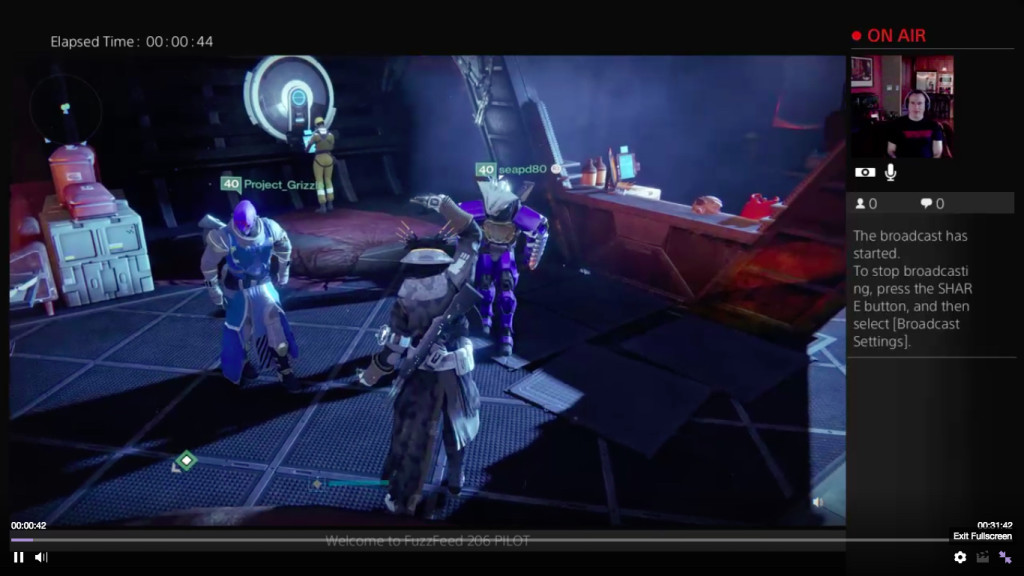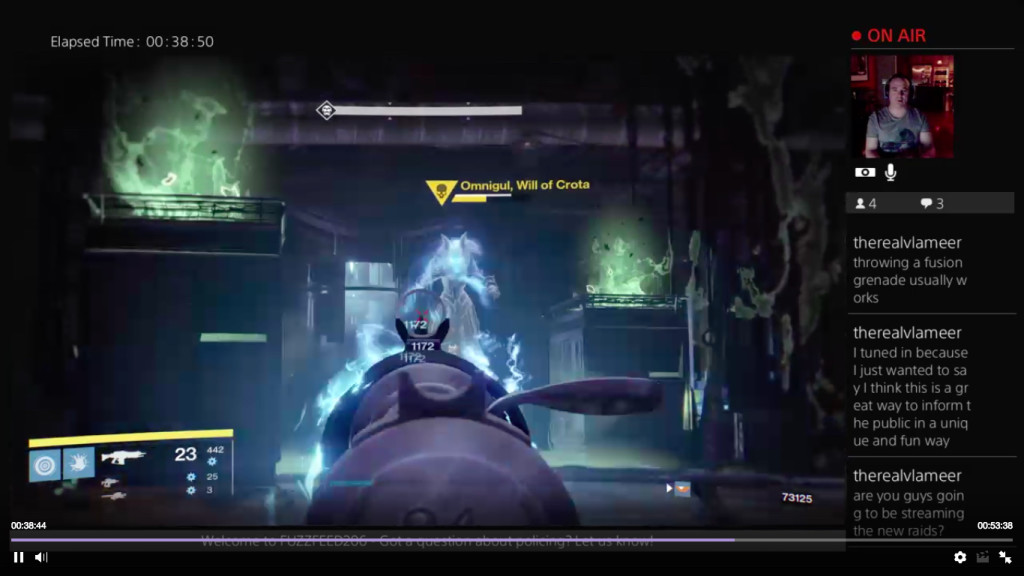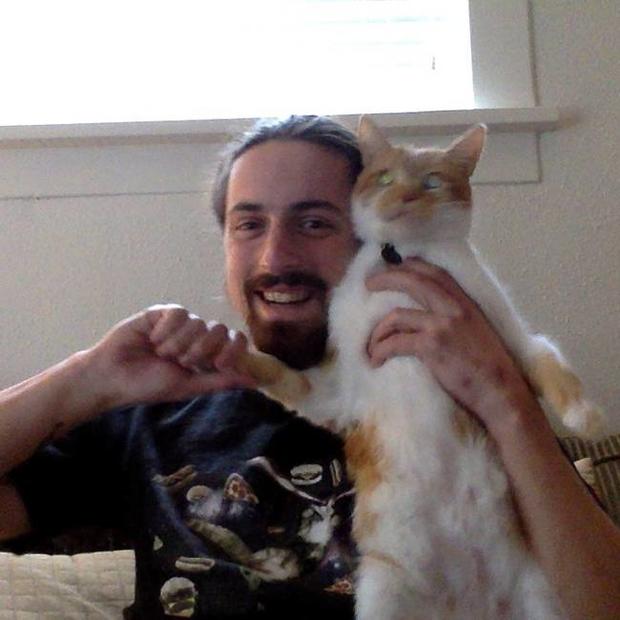In 2012, the Seattle Police Department, facing evidence of excessive use of force and patterns of biased policing among its ranks, pledged to clean up its act. In a consent decree with federal Department of Justice, it committed numerous reforms. One of them was rebuilding public trust.
Since then, the department has created police athletic leagues, started a cop-led chess program, and hosted “Donut Dialogues,” where officers have friendly chats with local youth over pastries from the local Top Pot chain. The department has also leaned heavily into social media, where it is particularly notorious for its antics on Twitter.
Now, the SPD’s communications team — Sgt. Sean Whitcomb, Detective Patrick Michaud, and Jonah Spangenthal-Lee — is taking it one step further.
Since last October, the three have been broadcasting their weekly adventures in the hit multiplayer action game Destiny via the livestreaming site Twitch. As they duke it out with hordes of angry space aliens, they discuss the finer points of policing and take questions from viewers, their conversations beamed across the interwebs along with the action on screen.
The SPD’s Twitch channel, called Fuzzfeed206, is thought to be the first of any police department in the country. And while it might sound like fun and games, in between firing pulse rifles and trading quips, the officers are tackling some of the city’s most serious subjects for an audience that would be hard to reach via traditional channels.
“It’s an opportunity to share information in a manner that is unexpected and unconventional,” Whitcomb says. “Some of the material we’re able to tackle — it just feels a little easier talking about heavier subjects with the backdrop of a video game. It eases some of the tension.”
If you’re having a hard time imagining this, let me explain. Livestreaming video games is exactly what it sounds like: A couple of gamers, or even a professional video game jockey or two, partake in all manner of digital adventures and broadcast the action out to the world. Some streams draw you in with the action or suspense, but others, like SPD’s, ride more on the personality and humor of the players themselves. Whitcomb, Michaud and Spangenthal-Lee spend most of the show talking about policing and public safety, only commenting on the game as required to make progress (and to grumble about how poorly they’re doing — they’re honestly pretty atrocious).
In gamer parlance, Destiny is a "massively-multiplayer online role-playing game" or MMORPG. Translation: Lots of people can play it at the same time, each of them from the comfort of their own couch and game console. The action is set in a sci-fi future in which humanity, after enjoying a long period of prosperity and interstellar expansion, has been relegated to a single remaining city on Earth by some mysterious catastrophe. There are plenty of aliens, and they’re all naturally intent on wiping us out completely. Thankfully, there is a horde of willing “Guardians” who turn on their PS4’s or Xbox Ones every night and fight back.

The SPD show, which airs Wednesday nights at 7:30 pm, started out as water cooler banter among the communications staffers, who played the game recreationally. Now they make up a Destiny “fireteam.” The show is broadcast from Whitcomb’s in-game perspective, with Michaud and Spangenthal-Lee joining in on the voiceover.
The three hold forth on everything from petty crime to immigration enforcement. “We want to make sure everyone feels safe where they live,” Whitcomb said in one broadcast, while dodging explosive orbs from a screaming space banshee. “That literally means everyone. We are not interested in your status, we’re not interested in if you’re documented. We’re interested in public safety.”
Toward the end of the most recent stream, Spangenthal-Lee regaled viewers with stories from the blotter involving a hot tub sabotaged with eggs, an armed robber discovered hiding under a boat by a K9 unit, and a pair of jokers who broke into a garage to find a power outlet for impromptu tattoos, attempting to steal a large elephant statue while they were at it.
“At first I was like, ‘This is ridiculous, why would you want to watch somebody play games?’” says Fe Lopez, the head of the city’s Community Police Commission, who was introduced to the concept of streaming via younger relatives and has since become a fan of the SPD Twitch program. “But gaming is a diverse world, so reaching out to a younger, more diverse crew is a really appealing idea.”
Lopez’s praise for the program isn’t a CPC endorsement — she emphasizes that she is speaking in her capacity as a private citizen. But, she says, “I like the out-of-the-box thinking, breaking the mold of the traditional model of what folks consider community engagement.”
The SPD players admit that it’s still a work in progress. “I’ll be honest, it’s not as easy as the streamers who do it professionally make it look,” Whitcomb says. The biggest audience they’ve garnered so far is fewer than 100 “unique viewers.”
But, as Spangenthal-Lee points out, the SPD’s Twitter following wasn’t exactly huge when they first started taking that platform more seriously. Now, they’ve got just shy of 382,000 followers.
Furthermore, Whitcomb says, the gamer demographic is one the police would love to reach. “A lot of folks that are in this age range don’t have cable,” Whitcomb observes. “They’re not watching the 5 o’clock news.”
Many of them, however, are avid consumers of online gaming content. Last year, Twitch users devoured 292 billion minutes of games and game-related content. Seattle itself is a hub of game development and gamer culture. Bungie, the creator of Destiny, is based in nearby Redmond. Each summer, Seattle hosts the massive gaming and nerd culture convention PAX West.

And amid the SPD's alien-blasting, there are unexpected moments of candor. In a recent stream, while alternately zapping hostile drones with a laser rifle and discussing the recent standoff between police and a distraught, suicidal man brandishing a knife, Whitcomb and Michaud offered an unscripted reflection on how far the SPD’s response to such situations has come.
“Ten years ago, there’s a very high likelihood that this young man would have been shot,” Whitcomb reflected soberly. He didn’t mention him by name, but one imagines he was thinking of John T. Williams, the Native American woodcarver who was fatally shot by a Seattle police officer in 2010 because he was carrying a knife, one of the tools of his trade.
Now, Michaud explained, officers are trained to deescalate situations by utilizing time and distance. In this case, officers responding to the situation brought in barrier fencing to cordon the man off and spent hours waiting it out. In the end, the man was taken to Harborview Medical Center for treatment. No shots were fired, and no charges were filed.
Responding to motorists who were so chagrined by the traffic delay that they took to Twitter to suggest that the SWAT team should “just shoot him and get it over with,” Whitcomb replied: “We have an obligation and a responsibility to ensure that we are doing everything we can to get this young man safely into a space where he can get help. Quite honestly, no one would expect anything less if it was their son or daughter or their mother or their father.”
Although the SPD team tackles serious, sometimes controversial material, it’s clear they’re having fun with it. They even took to Twitter to challenge the staff at local KIRO radio to a Sparrow race — a game within the game, where the players hit the track on Destiny’s version of Star Wars’ speeder bike.
https://twitter.com/SeattlePD/status/846523949638868992
And they do lose a lot, which leads to some entertaining banter. After the SPD fireteam succumbed to the aforementioned space banshee, Spangenthal-Lee proclaimed resignedly, “There’s the wipe!” That's gamer speak for utter failure.
“Yes, we are certainly amateurs,” Whitcomb observed wryly. “This is I think indisputably our least favorite strike.”
Spangenthal-Lee, the one civilian member of the team, says the gamer humor helps humanize police officers. “I’m not a cop, but I think there’s sometimes an expectation about who cops are,” he says. “There’s an expectation that cops are going to be jocks, so when they’re playing video games or talking about Star Wars on Twitter, there’s an incongruity that comes up.”
All three members of the team are unabashed nerds, Spangenthal-Lee says. Whitcomb, he says, has a giant shrine to Boba Fett next to his desk.
“I think that’s probably one of the goals that we have, is to make this as relatable as possible,” says Michaud. “So people feel that they can approach us and ask us the tough questions, and we can give them a straight answer and they’re going to believe it.”
—
This series is made possible with support from Comcast. The views and opinions expressed in the media, articles, or comments on this article are those of the authors and do not reflect or represent the views and opinions held by Comcast.




